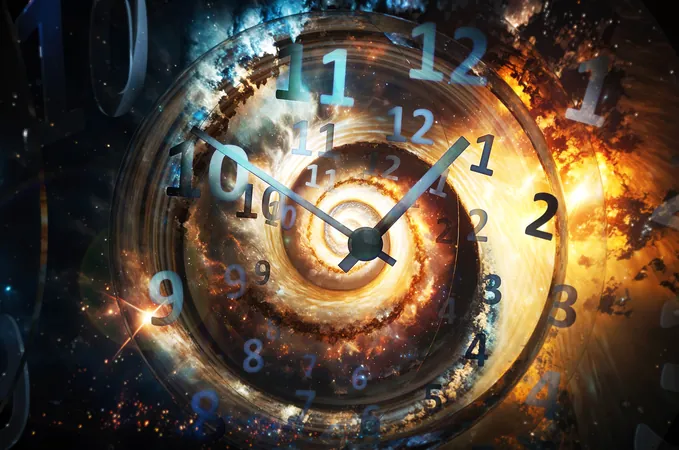
Is Time Just a Trick of the Mind? Exploring the Mind-Bending Reality of Temporal Existence
2025-01-11
Author: Ting
The Illusion of Time: A Perspective Shift
Numerous researchers and physicists argue that time may be nothing more than an illusion—a trick of our perception rather than a fundamental aspect of reality. This notion challenges our deeply ingrained beliefs about time flowing from the past, through the present, and into an unknown future. One unsettling assertion, made by eminent scientists, is that the equations underlying physics do not inherently characterize which events are occurring 'now.' This claim highlights a profound discrepancy between our sensory experience of time and the abstract equations of modern physics.
Daily Life and Time Perception
In our day-to-day existence, we rely on the clear demarcations of past, present, and future. We manage appointments, deadlines, and schedules based on an unwavering certainty in time's flow. But what if our perception is misleading? Dr. Carlo Rovelli, a prominent theoretical physicist from France, has explored concepts within loop quantum gravity that often challenge the notion of a universal flow of time. His work encourages us to reconsider how we interpret temporal flow, suggesting that perhaps our sense of 'now' is constructed rather than real.
Einstein and the Revolution of Time Understanding
The legacy of Albert Einstein undeniably reshaped our grasp of time. His theory of relativity revealed that time is not constant; it is influenced by speed and gravity. This concept, known as 'time dilation,' was illustrated through experiments affirming that time elapses differently for objects in strong gravitational fields or for those moving at exceptional speeds. Furthermore, Einstein’s insights encouraged a view in which all moments may exist simultaneously rather than as a relentless progression from past to present to future. This revolutionary thinking has prompted scientists to ponder if our perception of a distinct 'now' is merely a simplification of a more complex reality.
The Interaction of Quantum Mechanics with Time
Quantum mechanics adds another layer of complexity to time's existence. Traditionally, time is treated as a constant ticking clock in the backdrop of quantum events. However, recent investigations indicate that it may not be possible for any observer to ascertain a universal snapshot of 'now.' Some theorists have attempted to eliminate time from equations altogether in a quest for a unified understanding of the cosmos. The Wheeler-DeWitt equation famously excludes time, focusing on relationships within the universe rather than its evolution—a suggestion that time may be a construct of local interactions rather than an intrinsic feature of the universe.
The Arrow of Time: Entropy's Role
Despite theories that undermine time's concrete existence, we inherently perceive an undeniable directionality in our experiences—the 'arrow of time.' We witness events unfold in one direction—eggs break, not unbreak. This perception aligns closely with the concept of entropy, a measure of disorder that tends to increase in isolated systems, leading us to associate the passage of time with growth in disorder. The second law of thermodynamics states that entropy in a closed system will only increase, which affirms the sense of time marching inevitably forward. The birth of the universe, with its low-entropy conditions, laid the groundwork for this irreversible march toward disorder, highlighting the statistical nature of time's arrow.
The Human Perspective: An Ever-persistent Belief in Time
Some experts speculate that one day we may view time similarly to currency—an ingenious mechanism of organization rather than a core aspect of existence. Yet humans continue to navigate life as if each moment holds significant importance. Our biological clocks dictate rhythms of existence, schedules dictate our days, and the concept of 'tomorrow' remains tantalizingly out of reach. Whether time's essence is an illusion, a by-product of thermodynamic principles, or emerges from deeper, more complex laws of nature, our day-to-day lives remain steeped in temporal experience. The more profound puzzle may not be whether time exists but rather why our brains cling so fiercely to the notion of its linear flow and why abandoning this idea proves so difficult. Will humanity evolve to grasp the intricate and enigmatic nature of time? Only time, paradoxically, can tell. So, are we prisoners of a grand illusion, or is there more to the fabric of time than meets the eye? The ongoing debate persists, encouraging a deeper inquiry into the nature of our reality. Stay tuned for further explorations into the mysteries of existence!


 Brasil (PT)
Brasil (PT)
 Canada (EN)
Canada (EN)
 Chile (ES)
Chile (ES)
 Česko (CS)
Česko (CS)
 대한민국 (KO)
대한민국 (KO)
 España (ES)
España (ES)
 France (FR)
France (FR)
 Hong Kong (EN)
Hong Kong (EN)
 Italia (IT)
Italia (IT)
 日本 (JA)
日本 (JA)
 Magyarország (HU)
Magyarország (HU)
 Norge (NO)
Norge (NO)
 Polska (PL)
Polska (PL)
 Schweiz (DE)
Schweiz (DE)
 Singapore (EN)
Singapore (EN)
 Sverige (SV)
Sverige (SV)
 Suomi (FI)
Suomi (FI)
 Türkiye (TR)
Türkiye (TR)
 الإمارات العربية المتحدة (AR)
الإمارات العربية المتحدة (AR)